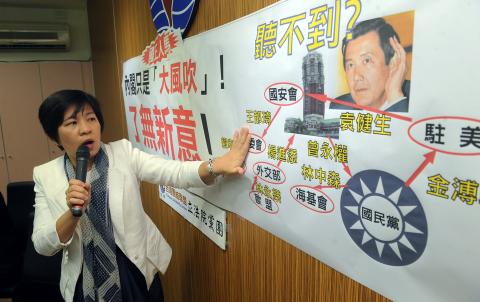The latest reshuffle of top officials in charge of US and China affairs was another example of “inbreeding” in the administration of President Ma Ying-jeou (馬英九), the opposition said yesterday, adding that the inexperienced officials’ ability to handle external relations was questionable.
National Security Council adviser Wang Yu-chi (王郁琦) and former Chinese Nationalist Party (KMT) secretary-general King Pu-tsung (金溥聰) were tapped for the jobs because of their close relationship with Ma, not for their experience and expertise, the Democratic Progressive Party (DPP) and the Taiwan Solidarity Union (TSU) said.
In a partial Cabinet reshuffle announced on Wednesday, Wang will take over as Mainland Affairs Council minister, while King will become Taiwan’s -representative to the US.

Photo: Lo Pei-der, Taipei Times
“It was definitely surprising,” DPP Policy Research Committee executive director Joseph Wu (吳釗燮) — who held both positions under the former DPP administration — said in response to a media inquiry about the reshuffle.
Wu served as council chairman between 2004 and 2007 and representative to the US between 2007 and 2008.
He said inexperience would be the primary concern for the two in handling Taiwan’s most important external relations.
King is not a professional diplomat, the criteria Ma had set for diplomatic appointments when he was inaugurated in 2008, Wu said, adding that King also lacked the coordination and communication skills that would be crucial in dealing with US government agencies, the US Congress and the overseas Taiwanese community.
Incoming minister of foreign affairs David Lin (林永樂), who replaced Timothy Yang (楊進添), will likely be sandwiched between King and new National Security Council secretary-general Jason Yuan (袁健生), both known for their aggressiveness, Wu said.
The appointment of Wang, along with Lin Join-sane (林中森) as Straits Exchange Foundation chairman, means that Taiwan will face complicated cross-strait affairs and negotiations with a pair of officials who have no previous experience on China, he said.
“They are not familiar with Chinese affairs or the Chinese officials they have to deal with. And vice versa ... It is a huge risk,” Wu said.
Naming his confidants to the positions signaled Ma’s intention to gain “complete control” over cross-strait affairs and foreign relations, DPP caucus whip Ker Chien-ming (柯建銘) said.
“Most of all, it could be the prelude to Ma’s pursuit of a peace agreement with China as part of his presidential legacy, which would be a dangerous move that could jeopardize Taiwan’s sovereignty,” Ker said.
The DPP has launched a campaign calling for a complete reshuffle of the Cabinet to “save Taiwan’s economy,” ahead of tomorrow’s vote of no confidence against the Cabinet in the legislature.
TSU caucus whip Huang Wen-ling (黃文玲) said the appointments once again shows that Ma makes personnel decisions “inside his inner circle” of trusted aides who share his ideology.
The TSU said that Minister of Economic Affairs Shih Yen-hsiang (施顏祥), Council for Economic Planning and Development Minister Yiin Chii-ming (尹啟銘) and Council of Labor Affairs Minister Jennifer Wang (王如玄) should be replaced for their poor performance.

An essay competition jointly organized by a local writing society and a publisher affiliated with the Chinese Communist Party (CCP) might have contravened the Act Governing Relations Between the People of the Taiwan Area and the Mainland Area (臺灣地區與大陸地區人民關係條例), the Mainland Affairs Council (MAC) said on Thursday. “In this case, the partner organization is clearly an agency under the CCP’s Fujian Provincial Committee,” MAC Deputy Minister and spokesperson Liang Wen-chieh (梁文傑) said at a news briefing in Taipei. “It also involves bringing Taiwanese students to China with all-expenses-paid arrangements to attend award ceremonies and camps,” Liang said. Those two “characteristics” are typically sufficient

A magnitude 5.9 earthquake that struck about 33km off the coast of Hualien City was the "main shock" in a series of quakes in the area, with aftershocks expected over the next three days, the Central Weather Administration (CWA) said yesterday. Prior to the magnitude 5.9 quake shaking most of Taiwan at 6:53pm yesterday, six other earthquakes stronger than a magnitude of 4, starting with a magnitude 5.5 quake at 6:09pm, occurred in the area. CWA Seismological Center Director Wu Chien-fu (吳健富) confirmed that the quakes were all part of the same series and that the magnitude 5.5 temblor was

The brilliant blue waters, thick foliage and bucolic atmosphere on this seemingly idyllic archipelago deep in the Pacific Ocean belie the key role it now plays in a titanic geopolitical struggle. Palau is again on the front line as China, and the US and its allies prepare their forces in an intensifying contest for control over the Asia-Pacific region. The democratic nation of just 17,000 people hosts US-controlled airstrips and soon-to-be-completed radar installations that the US military describes as “critical” to monitoring vast swathes of water and airspace. It is also a key piece of the second island chain, a string of

The Central Weather Administration has issued a heat alert for southeastern Taiwan, warning of temperatures as high as 36°C today, while alerting some coastal areas of strong winds later in the day. Kaohsiung’s Neimen District (內門) and Pingtung County’s Neipu Township (內埔) are under an orange heat alert, which warns of temperatures as high as 36°C for three consecutive days, the CWA said, citing southwest winds. The heat would also extend to Tainan’s Nansi (楠西) and Yujing (玉井) districts, as well as Pingtung’s Gaoshu (高樹), Yanpu (鹽埔) and Majia (瑪家) townships, it said, forecasting highs of up to 36°C in those areas